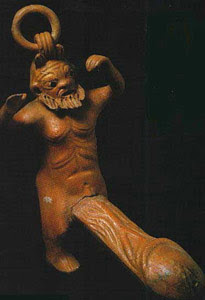S£X AMONG THE ROMANS
The erotic shows
There are testimonies of erotic shows performed in some places, of which we have remained the drawing, being unfortunately the’original lost.
It was an acrobatic porn exercise, whose representation comes from a thermopoly of Pompeii, placed at the’angle between the street and the alley of Mercury: the image of two tightrope walkers, evidently the’ main attraction of the room, who had to proceed with their feet along two iron bars stretched between two tables.
The woman, naked if not for a band that supported her breasts, had the task, walking prone, to reach the table on which stood a’anfora of wine and two mugs.
Behind her was a man, in a disembodied capacity, who pushed her by penetrating her anally while standing. The success of the’ enterprise lay in the fact that the woman managed to pour the wine and offer it to the’uomo and then to drink it herself, all maintaining the precarious balance and making herself penetrate simultaneously. The tickets of this feat had to cost not a little.
VENUS PHYSICA
In Pompeii, in itself already dedicated to Venus, there was the cult of Venus Physica, one of the most earthly aspects of the Goddess, referring to sexual pleasure and’coupling. Of course in the literature this epithet does not appear; for the Greeks we can speak of an Aphrodite Pandemic, but less corporeal than the Pompeian one, which is found only in the wall inscriptions found in Pompeii and safeguarded by the Vesuvian’eruption.
These inscriptions are collated in the Corpus Inscriptionum Latinarum, and therefore irrefutable. Here is one: "Health to you, O.. our. I beg you continuously, my lady; for Venus Physics I implore you not to reject me… " In another’, the same Goddess is affixed to her signature at the bottom of verses in which the dangers of loving dark-skinned girls are emphasized, because they are too passionate: “scripsit Venus physica Pompeiana”.
MISOGYNY
Romans and Greeks were similar for some misogyny, lest in the competition the males could lose points:
Juvenal loves the simple woman, hates "the one that is constantly referring to the Method of Palemon, without ever erring a rule of language and, flaunting his anticherics, quotes verses to him (Jovenal) unknowns…" otherwise, what figure does he make us?
"We have ages for pleasure," says the sage Demosthenes (Against Neera, 122) "the concubines for daily care, the wives to give us legitimate children and faithfully supervise our heritage." This is the Greek concept of woman, or sex or utility, of feelings is not spoken of, except for the young.
In the myth of Pandora narrated by Hesiod (Theogony, 590 and seg.): "From her comes the wicked line of women who dwell among men, great evil for mortals."
Herodotus (Book I) has some admiration for the Persians: “Before the age of five, the child never shows up in front of his father but lives together with the women.They do this because, if the child dies during the breeding period, the father should not suffer from it. what sensitivity and “When they learn of some pleasant custom, wherever it comes from, they immediately adopt it: for example they learned from the Greeks to practice love with adolescents...”
For Juvenal “Women's tears are just sweat of the eyes....” and then “A perfect wife, beautiful, elegant, rich, fruitful, of good family and of excellent morality, if it exists, would be unbearable for anyone.What nobility, what beauty, what virtue are worth so much to hear them constantly reproached?”
Plautus loves humor, maybe a little pesantuccio “Think how wise a little mouse is, never entrusts his life to a single hole....”
Aristophanes “There is nothing in the world worse than impudent women, except perhaps women.”
Hesiod “The woman, a food thief.”
Also for Herodotus “Silence gives women the grace that suits them.”
Not even Jupiter the great inseminator loves women, confesses him in the Iliad, he rapes and seduces out of boredom:
Iliad (XIV), speaks Jupiter:
"That never so much soul won me
and never so much did my heart give me love
of a mortal woman or a Goddess:
not when love won me over the bride
d'Issione, in which Pirithous was born
in the sense of the Numi similar; not when
of Danae, of Acrisius the daughter
from the graceful foot, from which Perseus was born
that it was of all men the clearest;
not when of Phoenix's daughter
so famous, that it gave birth
Minos and the deiforme Radamanto;
not when, in Thebes, of Semele and Alcmena
(and the magnanimous son Heracles this
she gave birth to me, Dioniso Letizia
of the world she begot); not when
the queen with beautiful foliage
Demetra, or of Latona glorious."






Comments
Post a Comment